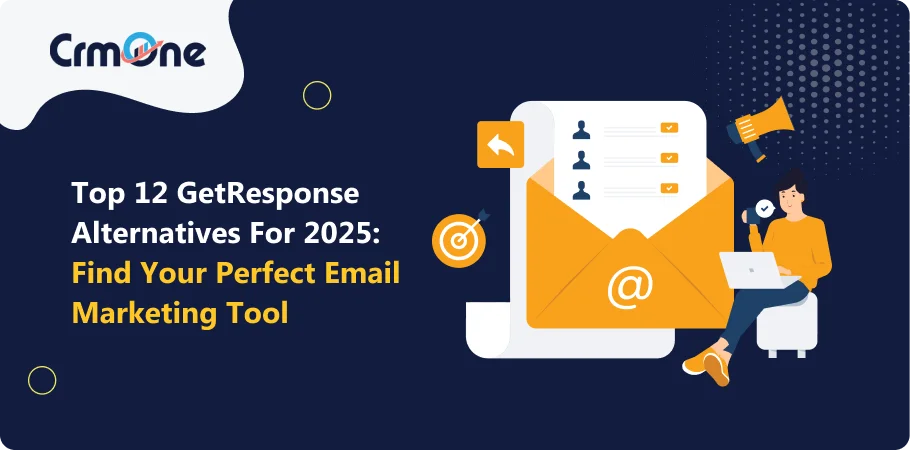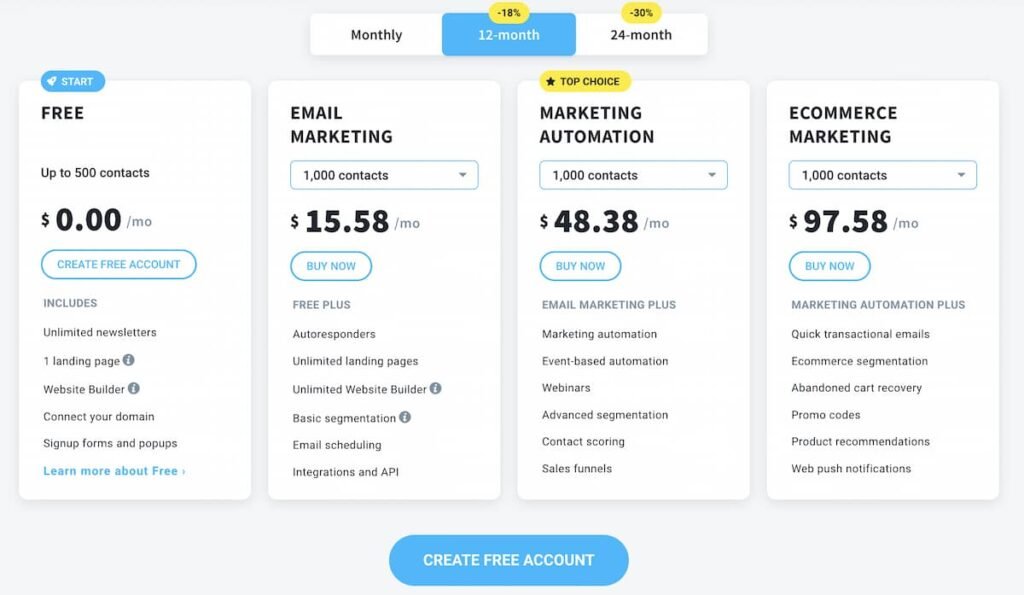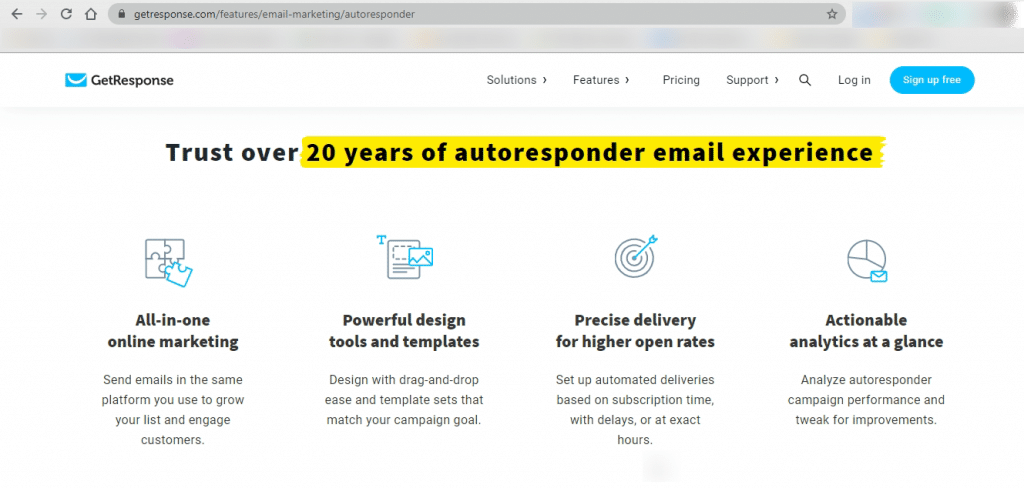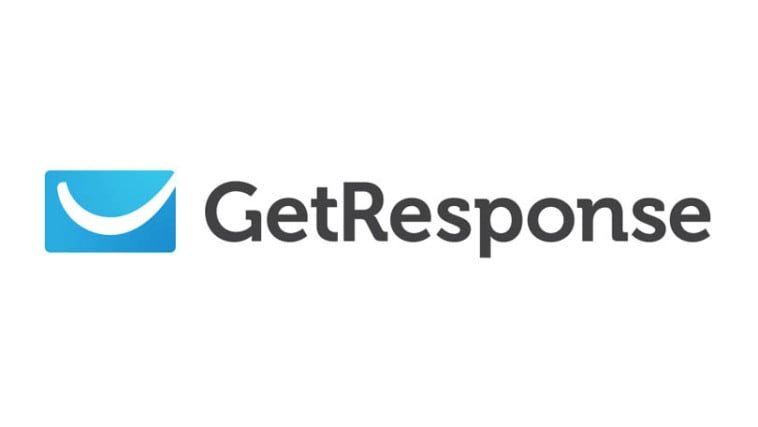Email marketing is vital for businesses today. GetResponse is a popular tool for this purpose.
But it’s not the only option. Many other platforms offer similar or better features. Discovering alternatives can help you find the best fit for your needs. Understanding GetResponse competitors can save you time and money. It can also improve your marketing results.
In this blog, we’ll explore various GetResponse competitors. This will help you make an informed decision. You can choose the right email marketing tool for your business. Stay tuned to learn more about these options.
Introduction To Email Marketing Tools
Email marketing tools have revolutionized the way businesses communicate with their audience. These tools offer a myriad of features designed to streamline the process of sending emails, managing lists, and analyzing campaign performance. In this section, we will delve into the importance of email marketing and the growth of email marketing tools, providing a comprehensive introduction to the landscape of email marketing solutions.
Importance Of Email Marketing
Email marketing is a powerful tool for businesses of all sizes. It allows companies to directly reach their audience, delivering personalized content that can drive engagement and sales. Here are some key reasons why email marketing is essential:
- Direct Communication: Email allows you to communicate directly with your audience without the noise of social media or search engines.
- Personalization: You can tailor your messages to individual preferences, increasing the likelihood of engagement.
- Cost-Effective: Compared to traditional marketing methods, email marketing is relatively inexpensive yet highly effective.
- Measurable Results: With email marketing tools, you can track open rates, click-through rates, and conversions, making it easier to measure success.
Growth Of Email Marketing Tools
Over the years, email marketing tools have evolved significantly. What started as simple email sending platforms have now become sophisticated marketing suites. Here’s a look at how these tools have grown:
- Advanced Automation: Modern email marketing tools offer advanced automation features, allowing businesses to send targeted messages based on user behavior.
- Integration Capabilities: These tools can now integrate with other marketing platforms, CRM systems, and e-commerce sites, providing a seamless marketing experience.
- Enhanced Analytics: Today’s email marketing solutions come with robust analytics, helping marketers make data-driven decisions.
- User-Friendly Interfaces: With intuitive interfaces, even those with limited technical skills can create, send, and manage email campaigns effectively.
One can hardly ignore the impact these tools have on the way businesses operate. They not only save time but also help in crafting more effective marketing strategies. Whether you’re a small business or a large enterprise, there’s an email marketing tool out there to meet your needs.
In the next sections, we will explore some of the top Getresponse competitors, comparing their features, pricing, and overall value to help you find the best fit for your business.
Criteria For Choosing Email Marketing Tools
When it comes to email marketing, choosing the right tool can make all the difference. With so many options available, how do you know which one to pick? It’s important to consider a few key criteria to ensure you select the best platform for your needs. In this section, we’ll explore some of the essential factors you should keep in mind when evaluating email marketing tools, with a focus on user-friendly interfaces and advanced features.
User-friendly Interface
Let’s face it, nobody likes complicated software. A user-friendly interface is crucial for any email marketing tool. You want something that’s intuitive and easy to navigate. Trust me, spending hours trying to figure out how to send a simple email is no fun! A good interface should have clear menus, drag-and-drop features, and straightforward options for creating and managing campaigns.
Imagine you’re a chef in a busy kitchen. You need your tools to be within reach and easy to use. The same goes for email marketing. You shouldn’t have to dig through layers of menus to find what you need. Look for platforms that offer a clean design and logical layout. This will save you time and reduce frustration.
Advanced Features
While ease of use is important, you also want a tool that offers powerful features. Think of it like owning a Swiss Army knife; it’s handy to have all those extra tools at your disposal! Advanced features can help you create more effective campaigns and reach your audience in new ways.
Consider what advanced features are important to you. Do you need automation to send emails based on customer behavior? How about A/B testing to see which subject lines get the best open rates? Maybe segmentation is key for you, allowing you to target specific groups within your audience.
Here’s a quick comparison table of some advanced features you might look for:
| Feature | Description |
|---|---|
| Automation | Send emails based on specific triggers or user actions. |
| A/B Testing | Compare different versions of emails to see which performs better. |
| Segmentation | Divide your audience into groups for targeted messaging. |
| Analytics | Track the performance of your email campaigns with detailed reports. |
In summary, choosing an email marketing tool involves balancing ease of use with powerful features. By considering these criteria, you’ll be better equipped to find a platform that meets your needs and helps you achieve your marketing goals. Remember, the right tool can make your email marketing efforts more efficient and effective, allowing you to connect with your audience in meaningful ways.
Mailchimp
When it comes to email marketing, Mailchimp is a well-known name. It’s one of the major players in the email marketing world and often compared to GetResponse. Whether you’re a small business owner or a marketer trying to grow an audience, Mailchimp offers a variety of tools that can help. Let’s dive into what makes Mailchimp a strong competitor.
Overview
Mailchimp started out as an email marketing service but has grown into a full-fledged marketing platform. It’s designed to help businesses of all sizes. With Mailchimp, you can create email campaigns, manage your audience, and analyze your results. It’s user-friendly, making it accessible even if you’re new to email marketing.
Pros And Cons
| Pros | Cons |
|---|---|
|
|
From my experience, Mailchimp is like that trusty old bike. It’s reliable, gets the job done, and is easy to use. But sometimes, you might wish it had a few more gears. The free plan is perfect for small lists, but once you grow, the costs can add up. And if you’re someone who likes tinkering with every little detail, you might find the template customization a bit limiting. But overall, it’s a solid choice.
So, if you’re looking for a user-friendly, reliable email marketing tool, Mailchimp is definitely worth considering. It might not be perfect, but it’s pretty darn close.

Credit: www.pabbly.com
Constant Contact
Constant Contact is a popular email marketing service. It offers tools to help businesses manage their email campaigns. With a focus on ease of use, it suits beginners and small businesses well.
Overview
Constant Contact provides a user-friendly interface. Users can create email campaigns, manage contacts, and track results. It offers a range of templates to make email creation simple. The platform also includes social media marketing tools, making it a versatile option.
It has been around since 1995 and has built a strong reputation. Many small businesses rely on its features. It aims to provide a comprehensive solution for email marketing needs.
Pros And Cons
Pros:
- Easy to use interface
- Wide range of templates
- Good customer support
- Includes social media tools
Cons:
- Higher cost compared to some competitors
- Limited automation features
- Fewer advanced options for experienced users
Constant Contact is a solid choice for those new to email marketing. While it may lack some advanced features, its ease of use and good support make it a reliable option.
Sendinblue
Sendinblue is a popular email marketing service known for its user-friendly interface and extensive features. It offers tools for email campaigns, SMS marketing, and automation. Many businesses appreciate Sendinblue for its affordability and ease of use, making it a strong competitor to Getresponse.
Overview
Sendinblue provides a comprehensive suite of marketing tools. These include email campaigns, SMS marketing, and automation. It also offers advanced segmentation, A/B testing, and detailed analytics. The platform is designed to help businesses grow their audience and engage with customers effectively.
Sendinblue is suitable for small to medium-sized businesses. It offers a free plan with limited features. Paid plans are affordable, making it accessible for businesses with smaller budgets. The platform supports multiple languages, which is beneficial for international users.
Pros And Cons
Pros:
- Easy-to-use interface
- Affordable pricing plans
- Comprehensive marketing tools
- Supports multiple languages
- Strong customer support
Cons:
- Limited features in the free plan
- Advanced features may require a learning curve
- Email design options are somewhat basic

Credit: www.crmone.com
Aweber
If you’re in the market for an email marketing service, you’ve probably heard of AWeber. It’s one of the oldest players in the game, offering a robust platform for businesses to manage their email campaigns. But, is it the right fit for you? Let’s delve deeper into what AWeber has to offer.
Overview
AWeber has been around since 1998, making it a veteran in the email marketing industry. It’s known for its user-friendly interface and excellent customer support. AWeber provides a range of features designed to help businesses grow their email lists, create engaging newsletters, and automate their email marketing efforts. It’s particularly popular among small businesses and entrepreneurs looking for an easy-to-use solution.
Pros And Cons
| Pros | Cons |
|---|---|
|
|
So, what does this all mean for you? If you’re looking for a reliable and easy-to-use email marketing service with great support, AWeber could be a good fit. However, if you need more advanced automation or are on a tight budget, you might want to explore other options.
Personally, I’ve found AWeber’s customer support to be a lifesaver on more than one occasion. There was this one time I accidentally deleted an entire email campaign right before a big launch. Panic mode, right? But, a quick chat with their support team, and they had me back on track in no time. Talk about a stitch in time saving nine!
Whether AWeber is the right choice for you depends on your specific needs and budget. Give it a try and see how it fits into your email marketing strategy.
Activecampaign
When it comes to email marketing tools, ActiveCampaign is a name that often pops up. Known for its robust features and user-friendly interface, it has carved a niche for itself as a powerful tool for businesses of all sizes. Whether you’re running a small startup or a large corporation, ActiveCampaign offers a suite of features designed to meet your email marketing needs. Let’s dive into what makes ActiveCampaign a noteworthy competitor to Getresponse.
Overview
ActiveCampaign is a comprehensive email marketing service that offers more than just email campaigns. It provides a wide range of features including marketing automation, CRM, and sales automation. Founded in 2003, ActiveCampaign has grown exponentially and now boasts over 130,000 customers worldwide. Its strength lies in its ability to automate complex processes while remaining easy to use. The platform is particularly popular among small and medium-sized businesses that need powerful tools without a steep learning curve.
Pros And Cons
As with any tool, ActiveCampaign has its strengths and weaknesses. Here’s a closer look at what you can expect:
| Pros | Cons |
|---|---|
|
|
In conclusion, ActiveCampaign stands out for its powerful automation and CRM capabilities. While it might be a bit pricier, the value it offers can justify the cost for many businesses. If you’re looking for a tool that can grow with your business and offer extensive features, ActiveCampaign is worth considering.
Convertkit
When it comes to email marketing platforms, ConvertKit has carved out a niche for itself. Designed with creators in mind, ConvertKit aims to simplify the process of managing your email lists, automations, and campaigns. If you’re considering alternatives to GetResponse, ConvertKit might be on your radar. But, is it the right tool for you? Let’s dive in and find out.
Overview
ConvertKit is an email marketing service that focuses on simplicity and functionality. It’s particularly popular among bloggers, podcasters, and content creators. The platform offers a user-friendly interface that’s easy to navigate, even for beginners. It emphasizes building and nurturing customer relationships through effective email marketing.
One of ConvertKit’s standout features is its ability to create automated email sequences. This can save you a lot of time and effort, allowing you to focus more on creating content and less on managing your email campaigns.
Pros And Cons
| Pros | Cons |
|---|---|
|
|
In conclusion, ConvertKit offers a streamlined, user-friendly option for creators looking to manage their email marketing with ease. While it might not have all the bells and whistles of some competitors, its focus on simplicity and automation makes it a compelling choice for many. Whether you’re a seasoned marketer or just starting out, ConvertKit provides the tools you need to build and nurture your audience effectively.
Mailerlite
MailerLite stands out as a strong competitor to Getresponse. It’s known for its simplicity and user-friendly interface. Small businesses and startups often favor MailerLite for its affordable pricing and robust features.
Overview
MailerLite offers a straightforward platform for email marketing. Users appreciate its drag-and-drop editor, making it easy to create beautiful emails. Its automation features help streamline marketing efforts. MailerLite also provides tools for landing pages, pop-ups, and surveys.
With MailerLite, you get access to a variety of templates. This helps save time and ensures your emails look professional. The platform also includes analytics to track the performance of your campaigns. These insights can help you make informed decisions about your marketing strategy.
Pros And Cons
MailerLite has several advantages. First, it’s affordable, making it accessible for small businesses. Second, it’s easy to use, which is great for beginners. Third, it offers a range of features, including automation and analytics.
However, there are some downsides. The customer support is not always responsive. Additionally, advanced users might find the features somewhat limited. There’s also a learning curve for those new to email marketing.
Overall, MailerLite is a solid choice for those seeking a simple, affordable email marketing solution.
Benchmark Email
When it comes to email marketing, finding the right tool can be like searching for a needle in a haystack. Enter Benchmark Email. This platform has been around the block and knows a thing or two about helping businesses connect with their audience. Let’s dive into what makes Benchmark Email a noteworthy competitor to GetResponse.
Overview
Benchmark Email is a powerful yet easy-to-use email marketing tool. Founded in 2004, it aims to provide businesses of all sizes with the tools needed to create effective email campaigns. With its intuitive interface and robust feature set, it has become a popular choice for those looking to enhance their email marketing efforts.
But what really sets Benchmark Email apart? For starters, it offers a comprehensive suite of email marketing features, such as:
- Drag-and-drop email builder
- A/B testing
- Responsive templates
- Advanced analytics
These features are designed to help businesses create, send, and track emails without breaking a sweat. And the best part? Benchmark Email caters to users at all levels, whether you’re a newbie or a seasoned pro.
Pros And Cons
Like any tool, Benchmark Email has its ups and downs. Let’s break it down:
| Pros | Cons |
|---|---|
|
|
One of the standout features of Benchmark Email is its user-friendly design. I remember the first time I used it; I was able to set up my first email campaign in no time. The templates are modern and responsive, making my emails look great on any device.
However, it’s not all sunshine and rainbows. While Benchmark Email is a solid choice for many, it has some limitations. The automation features, for instance, are not as advanced as those offered by GetResponse. Additionally, some users have reported occasional deliverability issues, which can be a headache.
So, is Benchmark Email the right choice for you? If you’re looking for an easy-to-use platform with a variety of templates and solid customer support, it’s definitely worth considering. However, if you need more advanced automation features and detailed reporting, you might want to explore other options.
Moosend
Moosend is an email marketing software that competes with Getresponse. It offers many features for email campaigns and automation. Small businesses and marketers often use Moosend for its simplicity and effectiveness.
Overview
Moosend provides a user-friendly platform for creating and sending emails. It includes drag-and-drop editors, ready-made templates, and advanced automation tools. Moosend also offers real-time analytics to track email performance.
With Moosend, you can segment your audience for targeted campaigns. It integrates with many third-party apps, making it a versatile tool. Moosend supports both beginners and experienced marketers.
Pros And Cons
Like any tool, Moosend has its strengths and weaknesses. Here are some key points to consider.
Pros:
- Easy-to-use interface suitable for beginners.
- Affordable pricing plans for small businesses.
- Extensive template library for quick email creation.
- Powerful automation features to save time.
- Real-time analytics for performance tracking.
- Good customer support with helpful resources.
Cons:
- Limited advanced features compared to some competitors.
- Some integrations may require additional setup.
- Occasional glitches in the drag-and-drop editor.
- Reporting features could be more detailed.
- Learning curve for complex automation workflows.
Omnisend
Omnisend is a popular email marketing tool. It targets e-commerce businesses. It offers many features to help users improve their email campaigns. With its user-friendly interface, Omnisend makes it easy to create and send emails. Many businesses use it as an alternative to GetResponse.
Overview
Omnisend provides various tools for email marketing. It includes automation, segmentation, and campaign management. Users can create emails using the drag-and-drop builder. The platform also supports SMS and web push notifications. Omnisend integrates with many e-commerce platforms. These include Shopify, WooCommerce, and BigCommerce. It aims to help businesses increase sales and improve customer engagement.
Pros And Cons
Omnisend has several advantages. It offers advanced automation features. Users can easily create automated workflows. The platform provides pre-built templates. This saves time and effort. Omnisend also supports multiple channels. This includes email, SMS, and web push. It integrates with many popular e-commerce platforms.
There are some downsides to Omnisend. The free plan has limited features. Users may need to upgrade for more advanced tools. The pricing can be expensive for small businesses. Some users find the reporting features lacking. They feel the analytics could be more detailed. Omnisend may not be the best choice for very small businesses.
Drip
Drip is a popular email marketing tool that helps businesses build and manage customer relationships. It is known for its user-friendly interface and advanced automation features. This tool is particularly useful for e-commerce businesses looking to improve their email marketing strategies.
Overview
Drip offers a range of features that make email marketing easy and efficient. It supports advanced segmentation and personalization, allowing businesses to target specific customer groups. Drip also provides detailed analytics to help users track their campaign performance. The platform integrates well with various e-commerce platforms, which is a big plus for online stores.
Pros And Cons
Pros:
- Easy-to-use interface
- Advanced automation features
- Excellent customer segmentation
- Comprehensive analytics
- Seamless integration with e-commerce platforms
Cons:
- Higher pricing compared to some competitors
- Limited templates available
- Steeper learning curve for beginners
Hubspot
When it comes to email marketing platforms, GetResponse is a popular choice. However, it’s always good to explore other options before making a decision. One of the strongest competitors in the market is HubSpot. Known for its comprehensive suite of marketing tools, HubSpot offers a lot more than just email marketing. Let’s dive into the details.
Overview
HubSpot is a powerful all-in-one marketing platform that provides tools for email marketing, social media management, content management, and more. Founded in 2006, HubSpot has grown to be a favorite among businesses of all sizes. Its user-friendly interface and extensive features make it a strong contender in the email marketing space.
Pros And Cons
- Comprehensive Toolset: HubSpot offers a wide range of tools beyond email marketing, including CRM, social media management, and analytics.
- User-Friendly Interface: The platform is designed to be easy to use, even for beginners. Its drag-and-drop email editor is particularly intuitive.
- Excellent Customer Support: HubSpot is known for its outstanding customer support, including live chat, phone support, and a comprehensive knowledge base.
- Integration Capabilities: HubSpot integrates with numerous third-party applications, making it easy to connect with your existing tools.
- Cost: HubSpot can be expensive, especially for small businesses or startups. Its pricing is higher than many competitors, and advanced features come with a premium price tag.
- Complexity: While the interface is user-friendly, the sheer number of features can be overwhelming for new users. It might take some time to get the hang of everything.
- Limited Customization: Some users find that HubSpot’s email templates and customization options are somewhat limited compared to other platforms.
In conclusion, HubSpot is a robust marketing platform that offers a wide range of features. However, its cost and complexity may be a barrier for some users. If you’re looking for an all-in-one solution and are willing to invest the time and money, HubSpot is definitely worth considering.
Choosing The Best Tool
Choosing the right email marketing tool can be a daunting task. With so many options available, it’s easy to feel overwhelmed. But don’t worry; we’re here to help. In this section, we’ll break down some key considerations to help you find the best tool for your needs. Remember, the goal is to make an informed decision that will benefit your business in the long run.
Consider Your Needs
First things first, think about what you need. Do you need a tool for sending out newsletters, or do you need something more complex? Here’s a simple way to figure it out:
- Basic Features: If you need basic features like email templates and simple automation, many tools can do the job.
- Advanced Features: If you need advanced features like segmentation, analytics, and integrations with other tools, you’ll need to look for something more powerful.
- Budget: How much are you willing to spend? Some tools are free, but they might have limitations. Paid tools often offer more features.
It’s like shopping for a car. Do you need a simple, reliable car to get you from A to B, or do you need a high-performance vehicle with all the bells and whistles? Understanding your needs will help you narrow down your options.
Future-proofing Your Choice
Now, let’s talk about the future. The tool you choose today should still be useful as your business grows. Here are some things to consider:
- Scalability: Can the tool grow with your business? Look for tools that offer scalable plans.
- Updates and Support: Does the tool have regular updates and good customer support? This is crucial for long-term success.
- Community and Resources: Is there a community or resources available for learning and troubleshooting? A vibrant community can be a lifesaver.
Think of it like planting a tree. You want to plant it in a spot where it has room to grow and thrive. By considering these factors, you’re setting yourself up for success in the long run.
Remember, the best tool for you depends on your unique needs and future goals. Take your time, do your research, and choose wisely. Your future self will thank you!
Credit: www.bloggeroutreach.io
Frequently Asked Questions
Which Of These Companies Are Getresponse Competitors?
GetResponse competitors include Mailchimp, Constant Contact, AWeber, ActiveCampaign, and HubSpot. These platforms offer similar email marketing services.
What Is Getresponse Good For?
GetResponse is excellent for email marketing, automation, creating landing pages, webinars, and managing customer relationships efficiently.
Who Is Mailchimp’s Biggest Competitor?
Mailchimp’s biggest competitor is Constant Contact. Both offer similar email marketing services, but Constant Contact is known for its user-friendly interface and excellent customer support.
What Is Better Than Getresponse?
Mailchimp and ConvertKit are often considered better than GetResponse for their user-friendly interface and advanced features.
What Are The Top Getresponse Alternatives?
Some top alternatives to Getresponse are Mailchimp, Constant Contact, AWeber, Sendinblue, and ActiveCampaign.
Is Mailchimp Better Than Getresponse?
Mailchimp has a user-friendly interface and good analytics. Getresponse offers advanced automation. Choose based on your needs.
How Does Constant Contact Compare To Getresponse?
Constant Contact is great for beginners. Getresponse offers more advanced features. Your choice depends on your requirements.
Conclusion
Choosing the right email marketing tool is crucial. GetResponse has strong competitors. Each offers unique features and benefits. Compare them based on your needs. Consider pricing, ease of use, and customer support. Your ideal choice depends on your business goals.
Take your time. Make an informed decision. Test options if possible. The best tool will boost your email marketing success.





